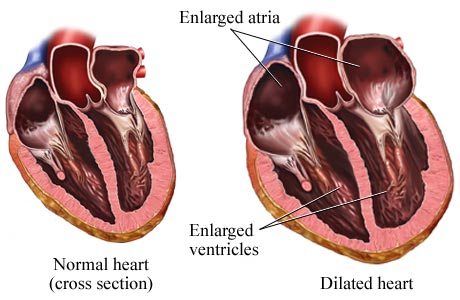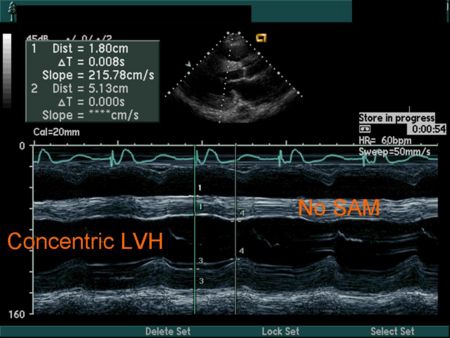Hypertensive Heart Disease – Symptoms, Treatment, Causes
What is Hypertensive Heart Disease?
It is otherwise known as hypertensive cardiovascular disease which happens when a person has high blood pressure or perhaps he or she is encountering complications of hypertension. When this happens, the heart’s workload increases then it will later lead to thickening of the muscles of the cardiovascular system and the heart. Despite that, the heart continues to do its job which is to pump blood all throughout the system. At first, the heart still compensates, but as time goes by, the heart’s left ventricular system will enlarge and it will lead to reduction of the pumping action of the heart which will in turn lead to a decrease blood supply in the entire system. Aside from that, this medical term is used by the ICD or International Classification of Disease categories as a coding system.

Thickening of the ventricles as seen in Hypertensive Heart Disease
Hypertensive Heart Disease Symptoms
Whether the person is undergoing or is suffering from heart failure, the person will manifest different signs and symptoms of hypertensive heart disease. When one has no hypertension, left ventricular hypertrophy (enlargement of the heart) or heart failure, the person will not manifest any symptoms at all. The symptoms associated with this disease include:
- Cardiomegaly
- Fatigue
- Nausea
- Gaining weight
- Ankle and feet swelling
- Palpitations
- Orhtopnea or having difficulty sleeping flat in bed
- Abdominal bloating
- Pain in the abdomen
- Frequency in urination
- Alteration in mentality
- Shortness of breath
Hypertensive Heart Disease Causes
In the presence of high blood pressure, there will be an increase in the pressure of the person’s blood vessels. When this happens, the heart pumps harder to be able to deliver the right amount of blood all over the body despite the presence of the high blood pressure. At first, the heart will be able to compensate but in the long run, the heart will eventually give in and it will lead to the thickening of the musculature of the heart. Without the right treatment, there is a possibility that the person will develop a congestive heart failure.
Aside from that, high blood pressure will make the heart undergo ischemic episodes due to the thickening of the musculature and the increased need of oxygen via the red blood cells or through blood circulation. In short, having a high blood pressure will lead to blood vessel walls thickening which, when it reaches the worst point, it will lead to atherosclerosis which is a medical term that means an increase in the deposit of cholesterol in one’s blood vessels which will eventually cause a high risk of stroke as well as heart attacks.
In sum, those who are at high risk for this disease condition are as follows:
- Hypertensive persons
- Diabetic persons
- Persons who have high blood cholesterol level
- Persons who smoke a lot
- Persons who are living an inactive lifestyle
- Persons who have higer than the average acceptable BMI or Body Mass Index
Hypertensive Heart Disease Diagnosis
In determining if the person has hypertensive heart disease, the person needs to undergo tests such as:
Physical and Medical History Exam
What the physician does here is that he or she asks questions to the patient related to the condition as well as doing the necessary physical exam which is the IPPA or the Inspection, Palpation, Percussion and Auscultation.
Ultrasound scan
It is the usage of high frequency sound waves and creates an image of the systems in the person’s body.

A cardiac ultrasound showing left ventricular hypertrophy (LVH)
CT scan
It is an imaging method which uses the x-rays in creating the cross sectional portion of the person’s body.
EKG or Electrocardiogram
It is an exam that records the heart’s electrical activity.
Cardiac Echo
It is otherwise known as echocardiogram which also uses sound waves to create of a picture of a heart in motion.
Coronary Angiography Exam
It is a kind of exam which uses a contrast material or a special dye in combination with the x-ray for a clearer picture of blood circulation in the patient’s heart. In doing this test, the person needs to be tested for allergies prior to the test.
TEE or Transesophageal Echocardiography
It is a test that uses an ultrasound device which passes through the patient’s esophagus to create of an image of the musculature of the heart and its parts. Here, there is a need to use a transducer which directs the waves of the ultrasound, reflects it and translates the heart image.
Chest X Ray
The chest x-ray includes the x-ray of the lungs, heart, chest, large arteries, diaphragm and ribs.
Angiography Exam
It is another imaging exam which also uses special dyes and x-ray to be able to clearly visualize the person’s artery. This is also known as an arteriogram exam.
Lipid Panel Exam
This is an exam that determines the level of cholesterol (HDL), good cholesterol (LDL), or bad cholesterol, and triglycerides.
Hypertensive Heart Disease Treatment
The goal of treatment for this kind of condition is to manage heart disease as well as reduce blood pressure. The person is ideally prescribed medications under the category of either of the following:
- ACE or angiotensin converting enzyme inhibitors
- Beta blockers
- Diuretics
- Calcium channel blockers
Aside from the medications prescribed, the person is suggested to change itheir lifestyle as well as having diet modification. Such modifications needed may be either undergoing weight loss or activities such as exercise done in moderation, indulging in healthy food like vegetables, low fat dairy products, fresh fruits, fish, and whole grain. Aside from that, it is suggested that one must stay away from bad habits such as smoking.
Hypertensive Heart Disease Prevention
In the prevention of acquiring such a condition, one must do the following:
- Regular check of blood pressure
- Treatment of high blood pressure as soon as possible
- Control of hyperlipidemia
- Control of diabetes
- Regular exercise
- Cessation of smoking
- Reduction of alcoholic beverages
- Weight loss
Doing such will lead to a healthier you and prevent or lower the chances of acquiring this condition.